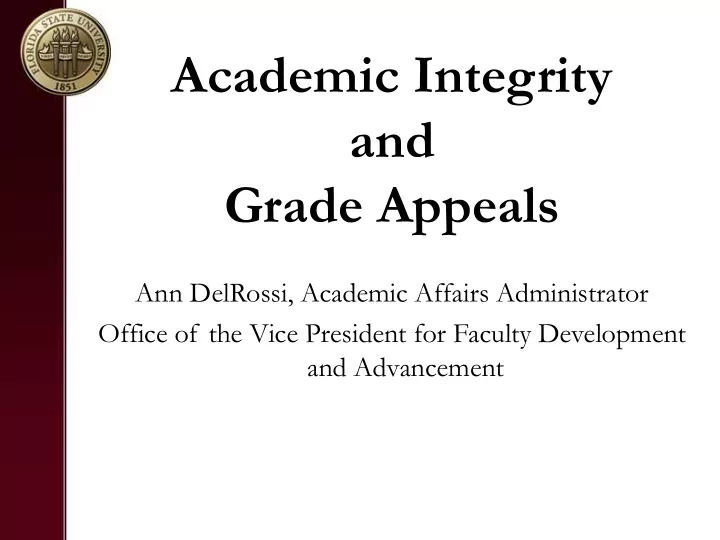

Academic Integrity and Grade Appeals Ann DelRossi, Academic Affairs Administrator Office of the Vice President for Faculty Development and Advancement
Grey Areas and Instructor Responsibility to Clarify • Note: Instructors are responsible for understanding and reinforcing the importance of the Academic Honor Policy in their courses and for clarifying their expectations regarding collaboration and multiple submission of academic work. (In writing and verbally)
Honor Policy Charges • Plagiarism • Cheating • Unauthorized Group Work • Fabrication, Falsification, Misrepresentation • Multiple Submission • Abuse of Academic Materials • Complicity in Academic Dishonesty • Attempting to Commit any above offense
Unauthorized Group Work • Unauthorized collaborating with others. – Typical Examples Include: Working with another person or persons on any activity that is intended to be individual work, where such collaboration has not been specifically authorized by the instructor. • 2015 survey results identify this as the behavior that students are most likely to enact and as one that isn’t typically viewed as cheating by students.
Multiple Submission Submitting the same academic work (including oral presentations) for credit more than once without instructor permission. It is each instructor’s responsibility to make expectations regarding incorporation of existing academic work into new assignments clear to the student in writing by the time assignments are given. Typical Examples Include: Submitting the same paper for credit in two courses without instructor permission; making minor revisions in a credited paper or report (including oral presentations) and submitting it again as if it were new work.
Fabrication, Falsification, and Misrepresentation Unauthorized altering or inventing of any information or citation that is used in assessing academic work . Typical Example Include : Inventing or counterfeiting data or information; falsely citing the source of information; altering the record of or reporting false information about practicum or clinical experiences; altering grade reports or other academic records; submitting a false excuse for a class absence or tardiness in a scheduled academic exercise; lying to an instructor to increase a grade.
Facebook Issues • Recently, instructors have discovered instances of students creating course-based Facebook groups and using them to collaborate on homework and/or quizzes. • If you assign individual work outside of class, please articulate your policy regarding collaboration clearly and be explicit about how it applies to study groups on Facebook and elsewhere online. For more information, see: http://fda.fsu.edu/Academics/Academic-Honor- Policy. • And it’s not just Facebook – GroupMe, Reddit, Quizlet, etc.
Online Testing Issues • 2015 Survey Results – frequency of reported cheating behaviors (from an average of 5% across all f-t-f exams to 22% collaborating with others, 25% getting unauthorized help, and 62-65% consulting unauthorized materials). • Resources – Testing Center offers proctored services to students who are both on and off campus: https://distance.fsu.edu/students/distance-learning- exams. • Support for online course development from ODL at: https://distance.fsu.edu/ and overall course development from CAT.
Preventing Academic Dishonesty • Create a thorough syllabus/emphasize your expectations • Remind students about working with integrity as needed/Not just Day 1 • Use resources such as Turnitin.com • Follow through on reporting AHP violations! • Build a professional relationship with your students
Academic Honor Policy Violations by Academic Year Reported by Incident Date • New Policy Effective Fall 2005
Academic Honor Policy Sanctions 2017-2018 Academic Year* Insert'cases'and'outcomes'– pie'chart
Grade Appeal System • Also involves integrity and starts with grading standards expressed in the syllabus • Emphasizes centrality of instructor judgment in grading process. Minimize exposure through consistency • Grade must be imposed in an arbitrary, capricious, or discriminatory manner to be overturned
Grade Appeal Flow Chart
For more information about the Academic Honor Policy, please go to http://fda.fsu.edu/ under Academic Resources or call our office at 850/644-6876
Recommend
More recommend